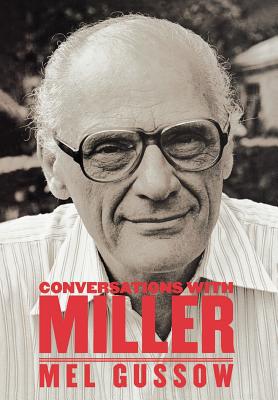| Winter Theatre Book- History and Depth in Centenary Reprint |
Theatre Writer Book |
| Mel Gussow , Nick Hern Books , January 22, 2016 |
 “Conversations with Miller” comprises the transcripts of thirteen conversations between dramatist and critic. Running to two hundred and twenty-two pages the earliest took place on 24th October 1963, the last on 23rd July 2001. For the reissue Nick Hern Books has added an introduction from Richard Eyre, originally a talk for Radio 3 from 15th August this last summer. He notes Miller's ambition “to make theatre matter”. For this most committed of writers to public issues Eyre notes too the baseline. The work is rooted in individuals, “all seeking” says Eyre “some sort of salvation in asserting a singularity.”
“Conversations with Miller” comprises the transcripts of thirteen conversations between dramatist and critic. Running to two hundred and twenty-two pages the earliest took place on 24th October 1963, the last on 23rd July 2001. For the reissue Nick Hern Books has added an introduction from Richard Eyre, originally a talk for Radio 3 from 15th August this last summer. He notes Miller's ambition “to make theatre matter”. For this most committed of writers to public issues Eyre notes too the baseline. The work is rooted in individuals, “all seeking” says Eyre “some sort of salvation in asserting a singularity.” As in the plays Miller spins many a compelling line in conversation. On the maker's commitment- “for an artist to put his soul into a work of art, he can't act. It has to be for real.” On the crafting of the base material, the words themselves, he says “When I tried to write prose, it was the dialogue that became the most persuasive, and the descriptive parts the most laboured. I was aware of that, too. I think that's essentially why I became a playwright.” But the lines are only as good as their realisation. He remembers “the most single magical moment of my life in the theatre.” Lee J Cobb is grappling with Willy Loman. The process is gradual. “Kazan kept saying “he's finding it.” The life is saturated in the turbulence of the times. “Back in the 1920s, Ann Arbor was the place where all the radicals who were thrown out of other universities ended up, from Harvard, Yale, Princeton.” It was not necessarily even politics that upset the Ivy League. Harvard shed itself of a scholar who advocated birth control. Miller was at the era-defining 1968 Democratic Convention in Chicago where outside the Hall “the cops were hitting the kids”. Miller's latter career saw much success in Britain and he has a view of cultural difference. “I think of England, where more probably they're dealing with more public issues, and more extrovert art.” Playwright and critic inevitably touch on theatre's own history. Gussow himself is observer in 1963 at a rehearsal directed by Elia Kazan. The cast includes Jason Robards, Faye Dunaway and Hal Holbrook. Miller recalls the lustre of Michael Blakemore reviving “All My Sons” with Rosemary Harris and Colin Blakely as Kate and Joe Keller. He has observations on Pinter, Mirren and Gambon, an actor he prefers to Olivier. Close-up he sees a line-up of different Willy Lomans. Of Dustin Hoffman he “has great internal life on stage...He can deal with more than one feeling at the same time...That kind of feisty quickness that I always associated with Willy.” He is different from Lee J Cobb or Thomas Mitchell or George C Scott. As for a revival of greatness in Britain “Warren Mitchell was extraordinary.” Theatre to be itself is theatre. It's not community activism or politics but sometimes, just sometimes, it spills over into a real-world impact. John Galsworthy changed the prison code with a play. Bernard Gimbel, department store magnate. came out of a Philadelphia theatre and wrote a memo to all managers. No staff, he decreed, were to be dismissed on grounds of age. The making of art rarely comes without a price. “I came to the edge of life a number of times” Miller confesses “once with the House Un-American Activities Committee.” As for the achievement Gussow asks: Do you want your epitaph to be: “He gave good parts to actors”? Miller: “I wouldn't mind. There are lesser things you can do with your life.” |
Reviewed by: Adam Somerset |
This review has been read 1886 times There are 35 other reviews of productions with this title in our database:
|
